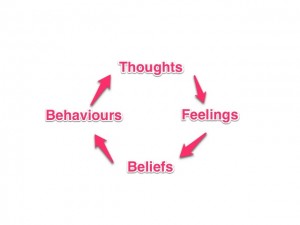Cognitive Behavioural Therapy, or CBT for short, is a short-term therapy, usually lasting for between 6 and 12 sessions, which aims to help you overcome a specific problem. Anxiety, depression, social phobias and eating disorders are all issues which can be worked on. CBT encourages you to notice your ‘automatic thoughts’ which limit your freedom to feel relaxed, happy, and to do what you want in everyday life. Your therapist will help you to challenge negative beliefs about yourself, and to risk making small changes, on a daily basis, which will put you, rather than that negative running commentary in your head, back in control. The counsellor is not going to ‘dig deep’ into your past, but will instead look at how your issues are spoiling your enjoyment of life and help you to feel better in the here and now. Any issue which is causing you to have negative thoughts about yourself, your life and your relationships can improve during CBT. You and your therapist will agree on what you want to change and then draw up a plan for each week of the therapy. Your goals will be small, measurable, realistic and form your ‘homework’ each week. For example, if you are a client who has anxiety and has lost your confidence to look for work, you might look at ways of reducing your anxiety by cutting down on the time you have to think about it. Your homework might be:
week 1 – find out phone numbers of voluntary organisations in your town
week 2 – ring or email them asking if they have opportunities for volunteers
week 3 – list the experience and skills you can offer
week 4 – practise mock interviews with a friend
week 5 – go for an interview
week 6 – work for half a day in a charity shop
Your therapist would encourage you to keep a diary of your thoughts and feelings and to notice if your worst fears actually ever happened- almost certainly they didn’t!
I hope I haven’t made CBT sound like ‘just a lot of goal-setting’; it’s not at all like that with a good therapist. It is very organised, and you will look at how you behave as a result of your problems in a lot of detail, and work out different ways of behaving and thinking, but your relationship with the counsellor or therapist is still the key to your feeling better. A warm, understanding, non-judgmental relationship is really important if CBT is going to help.
So, over the weeks, you will together set small, measurable goals, and then discuss how things went for you. You will talk a lot about your fears and your feelings as well as how you coped.
I believe that our thoughts, feelings, beliefs and actions are circular, and we can begin to change at any point on the circle. Sometimes, behaving differently helps us to see that our negative thoughts are untrue. Other times, noticing ourselves being negative and deliberately changing the thought, repeating a positive statement instead, can help us change how we feel, and how we behave. As the therapist, I know that my role is to help you, the client, to make a commitment to change, by working out a detailed plan which I support you to follow, while listening and understanding your thoughts and fears. Just because it’s called cognitive-behavioural therapy, doesn’t mean that your feelings are any less important; in fact expressing them fully is vital for change. An American study found that simply asking a group of unemployed workers to write down every week how they felt about being out of work, resulted in their getting jobs more quickly that those who didn’t put their feelings on paper. Recognising how we feel about our situation, accepting that it’s not about our failings as a person, but rather the result of the situation we find ourselves in, somehow gives us permission to forgive ourselves, realise we are just another normal human being, who has ‘got a bit stuck’, and find the strength to move on, back to a happier place!

